
The collaboration between FIDE and the World Federation for Chess Composition (WFCC) reached new heights in 2024, marked by several joint projects. Following the FIDE & WFCC World Cadet & Youth Chess Solving Championships in Italy and Brazil this November, a unique collection of 101 outstanding endgame studies was published to celebrate the art of chess over each year of the FIDE Centenary (1924–2024).
The project was spearheaded by Gady Costeff, an acclaimed endgame study composer and advocate for chess artistry. Inspired by a suggestion from FIDE Executive Director Victor Bologan, Costeff undertook the formidable task of picking out a single remarkable chess study for each year of FIDE’s history. Selecting one composer per year, without repetition, highlighted FIDE’s motto, “Gens Una Sumus” (We Are One Family). The result, One Endgame Study in a Thousand, draws from the annual production of roughly a thousand high-quality endgame studies on average.

In the words of the editor: “The 101 studies in this book are extraordinary, each in their own way. Incredible mate, stunning sacrifice, astonishing foresight, shocking capture avoidance, mind-boggling depth, humorous maneuvers, and many more delightful surprises await you. Taken together, these studies show the development of the endgame study over the period 1924–2024.
The studies are presented with up to six sequential diagrams. Each highlight gets its own diagram, so the reader can follow the action from start to finish, much like they would follow a chess game. The commentary includes insights on the studies, their history, and the composers whose work is presented.”
For more information about One Endgame Study in a Thousand, the FIDE Album series—the longest-running collaboration between FIDE and the chess composition world—and other works on chess composition, visit fidealbum.com.
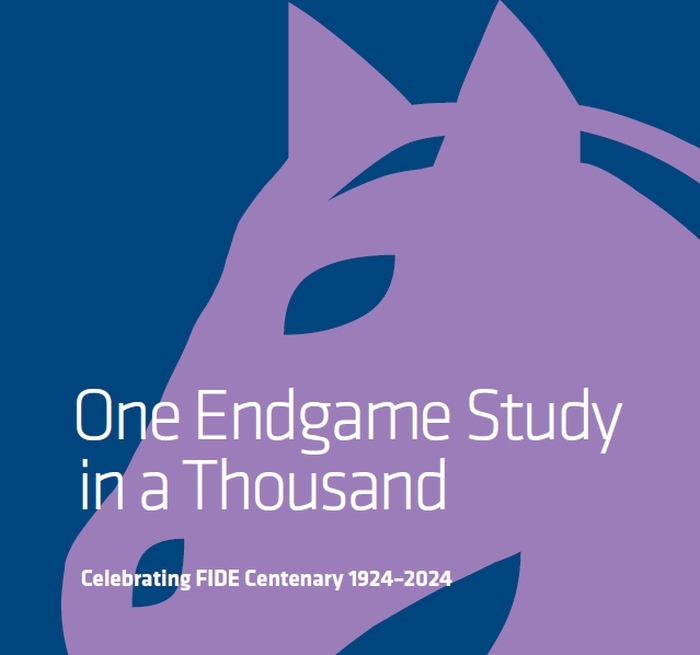
When the book celebrating the FIDE Centenary came out, it became the first link in the chain of further inspired initiatives. Renouncing his editor’s fee to support future projects popularizing chess composing, Gady Costeff (pictured below) has found a way to direct the booklet to the hands of future composers. He initiated and organized an international chess composing tourney for complete beginners in the field. To help them, he prepared a concise guide to composing endgame studies ending with a mate.
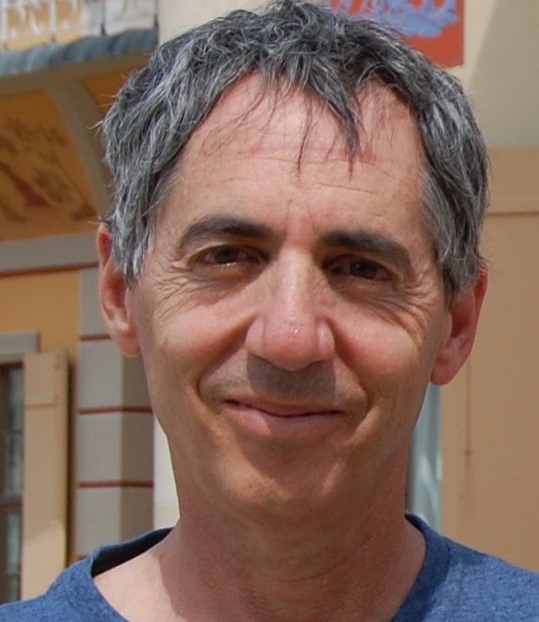
Photo: Gady Costeff’s personal archive
Who should be hosting such a tournament? The most fertile ground to look for the talents is India, not only the most populous country in the world, but also a chess superpower. Recognizing India’s immense potential as a chess superpower and its untapped talent in chess solving and composing, the tournament received enthusiastic support from Sagar Shah, Co-Founder & CEO of ChessBase India, and Satanick Mukhuty, Chess Composition Editor at ChessBase India.
The tournament, My First Endgame Study, invites novices in composing chess endgames. Entries are open until March 1, 2025, with results announced on March 31, 2025.
Let’s give the floor to Satanick Mukhuty, the Chess Composition Editor at CBI, who announced the competition.
My First Endgame Study: A Chess Composition Tourney Sponsored by WFCC and ChessBase India
Beneath its deceptively simple facade of a game, chess conceals a rich tapestry of human ingenuity and thought. It is, as widely remarked, art, science, and sport all rolled into one. Yet, while the competitive aspect of chess basks in the limelight with its high-stakes, action-packed tournaments and matches, the subtle but no less fascinating endeavour of chess composition, where artistry shines the brightest, languishes in relative obscurity. As a step towards redressing this imbalance, ChessBase India and the World Federation for Chess Composition (WFCC) present My First Endgame Study, a beginner-friendly study composing contest designed for chess enthusiasts eager to explore the creative world of chess composition, specifically studies.
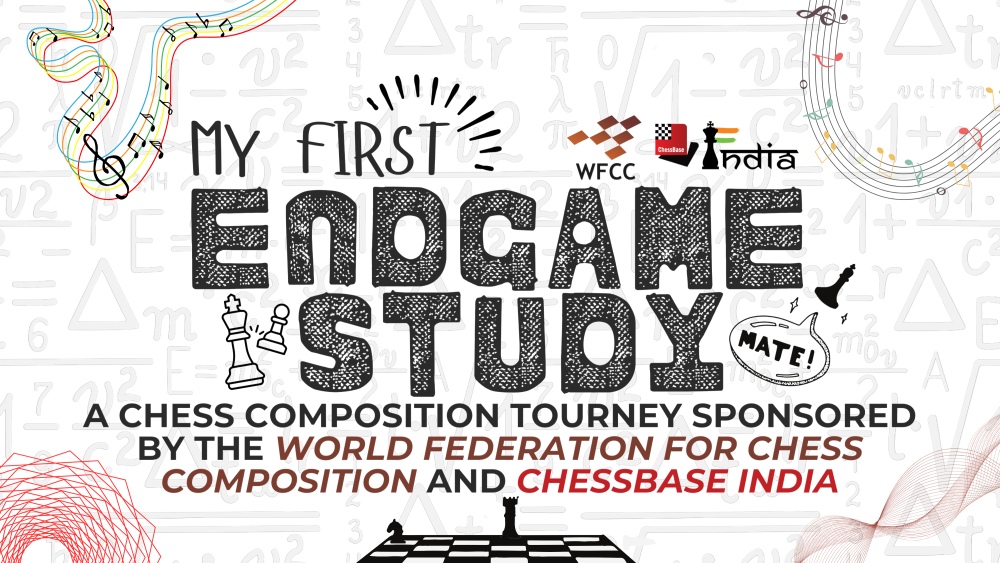
Chess compositions fall into two primary categories: problems and studies. In problems, the solver has to achieve the stipulated goal in a set number of moves (example: mate in 2, helpmate in 3, etc.). Studies, in contrast, are more game-like, seeking a win or a draw without restrictions on the number of moves. This is a study composition event only.
Anyone who has never published an endgame study can participate. This includes everyone from chess amateurs all the way to world-class players. There is no entry fee. Chess lovers of any age, nationality, etc., can apply!
The deadline to send your submission is March 1, 2025. Indeed, composing isn’t a rush job. Tapping into creativity and imagination takes time. You have two full months – January and February – to craft your masterpiece!
To participate, submit up to three endgame studies to Satanick Mukhuty, Director of the event, at chessbaseindiasocial@gmail.com. You can send the positions along with the intended solution in any format, but PGNs are preferred. Please, mention “My First Endgame Study” in the subject line, and include your name and place.
Theme: All submitted studies must have a checkmate finale; that is, the mainline must end in a mate. Newcomers, you have a clear target: choose a beautiful mate position and then work backwards to create an interesting sequence of moves leading up to it!
Results and prizes: The results will be published by March 31, 2025 – all participants will receive a link to the results, which will be presented by Gady Costeff.
We are excited to offer a wonderful prize pool for at least 10 most successful composers. Our top creators will receive:
- Monetary prizes, total of $250: $100, $75, $50, and $25 to 1st, 2nd, 3rd, and 4th places respectively.
- Exclusive copies of the highly anticipated book “One Endgame Study in a Thousand”
- Premium ChessBase products, including the brand-new ChessBase 18
Judge/Mentor: World-renowned composer Gady Costeff will serve as judge and mentor, offering feedback on submissions. Participants can contact him directly at costeff@gmail.com for advice.
How to Compose a Study: To wrap up, here’s Gady’s concise step-by-step guide, illustrated with two examples, to help you compose your first endgame study.
1. Choose a pretty mate position.
2. Where did the mating piece come from? Find a square to place it on, such that White’s only move to win is to give the mate.
3. Now find a last move for Black. All moves by Black should lose, and the composer gets to decide which of them Black will play in the solution!
4. Repeat the process. Sometimes you need to add material to force a move to be unique. Try to add as little material as possible.
5. Attractive qualities in a study: sacrifices, under-promotions, active play by both sides, and anything surprising.
Undesirable but sometime necessary: simple trade of material, sidelines that require long analysis, captures on the first move of a study. Try to maximize the desirable and limit the undesirable.
6. It is okay to start the study with a black move.
7. Learn from the examples below:
Example 01
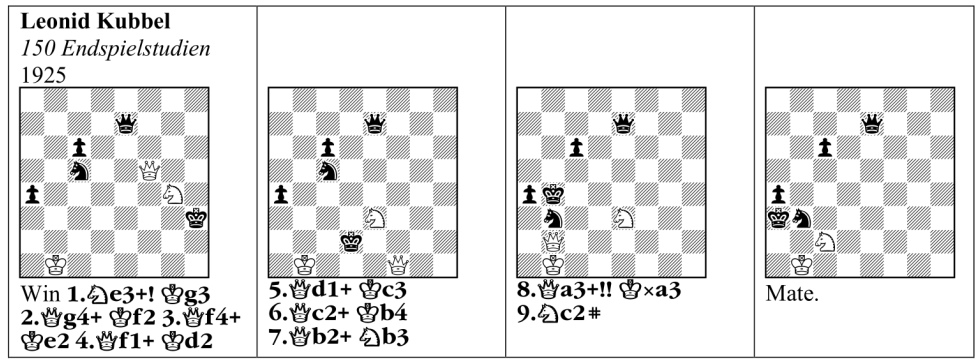
1. The black king is hunted across the board, where it is mated by just a king and knight! Such movement makes the study more dynamic.
2. 8.Qa3+!! is a beautiful queen sacrifice on an empty square, and it takes advantage of Nb3 blocking the black king.
3. Ideally, all units play during the solution. Here the black queen is just a spectator, which is a slight negative.
Example 02
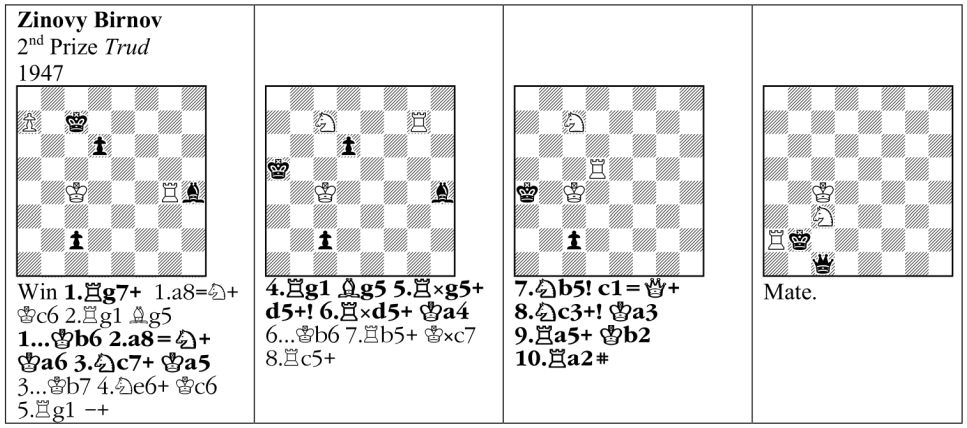
1. 2.a8=N+ promoting to a piece that is not a queen is a form of sacrifice. Sacrifices are artistically desirable because they are surprising.
2. 5.Rxg5+ d5+! and 7…c1=Q+ 8.Nc3+! are checks and immediate counterchecks. When both sides attack each other, the excitement rises which is artistically desirable.
3. Every unit participates in the mating picture. This is desirable, but not a requirement.
To inspire new artists on the chessboard, ChessBase India will publish a series of instructional articles. The first part, How to Compose an Endgame Study: A Step-by-step Guide, covers basic techniques for crafting studies, while subsequent parts will delve into advanced concepts like paradox, depth, geometry, and flow, as outlined in Secrets of Spectacular Chess (Friedgood and Levitt, 2008). We all know how challenging it is to analyze the essence of any art or creative process. Gady Costeff intends to uncover the secrets of chess composing as an art.
Through initiatives like these, Gady Costeff and ChessBase India are laying the groundwork for a new wave of creativity in chess composition.
Written by Marjan Kovačević, WFCC President and Satanick Mukhuty, Chess Composition Editor at CBI

